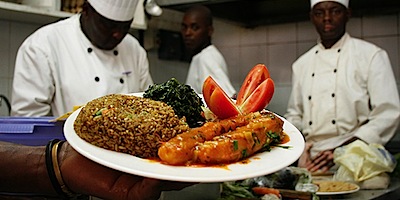
Matoke, spinach (local, or genuine Spinacea oleracea?) and rice (why not sorghum, or millet?) about to be served at a Nairobi restaurant. ((Ignore the tomato; everyone does.)) The photo illustrates an article in the Daily Nation, following up on Agriculture Minister William Ruto’s call for traditional crops to be given a greater role in Kenya’s food security plan. According to the article, Kenya’s farmers, or their representatives, seem to want more and better incentives to turn away from maize. I wonder, though, whether the most far-sighted farmers, and restaurants, won’t show the way by adopting agricultural biodiversity and thus turning a healthy profit, thank you very much.
There is a problem here with the idea of ‘traditional’ versus ‘indigenous’. Indigenous crops play a lowly role in feeding Africa. But introduced crops, now regarded as ‘traditional’, are very important – in fact everything on the plate: Asian rice, tomato from Latin America, spinach – probably the brassica sukuma wiki – and banana (from S.E. Asia). You could add Phaseolus beans, cassava, potato, sweet potato and plantation crops sugar and tea.
Note that I am not knocking indigenous crops. I once spent a wonderful 18 months collecting sorghum and millet in Kenya and loved the diversity of farming systems and crop varieties and uses (and meeting some fantastic farmers). But indigenous crops suffer from indigenous pests and diseases. Farmers could be better off with introduced crops, especially long-standing introductions they are familiar with (mango, onions, pyrethrum and lots more).
One of the seasonal joys of Nairobi is the Jacaranda bloom (from Latin America) whereas in other continents, the ‘Nandi Flame Tree’ (Spathodea nilotica) from upland Kenya and African Delonix species adds colour to urban streets.
The sad result of my collecting in Kenya was that the samples left in Kenya died in the Kitale seed store (equipment failure) and the samples for storage elsewhere were denied Kenyan export permission as a result of the international NGO ‘biopiracy’ campaign.